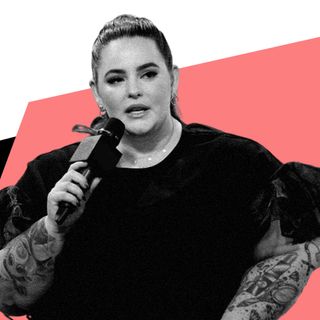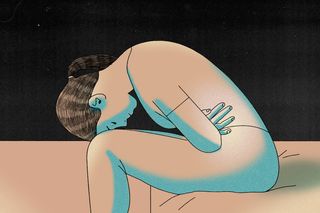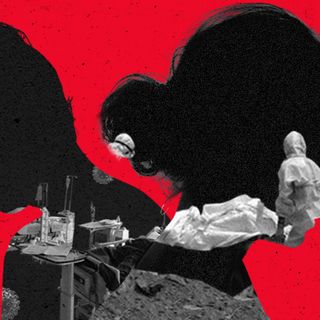
What It’s Like To Live With: Endometriosis
“I feel so angry and so helpless knowing how common it is, and yet how the medical community just neglects it.”

What It’s Like to Live With explores the stories of people who see and experience every day a little differently.
The article below mentions suicidal thoughts. In reading further, please keep in mind the content may cause emotional distress.
It took me 17 years to get a diagnosis for endometriosis. My symptoms began when I was around 10 years old, and I kept going from one doctor to another throughout my late childhood and teenage years. I had a set of digestive issues, I was experiencing frequent urination — but the advice I got was “don’t drink too much water.” I did experience period cramps too, but since I was always told it’s normal, I didn’t think much of it.
But everything escalated over the years and reached a point where I was worried I had colon cancer. Then when I turned 26, I developed ovarian cysts — and the doctors finally started taking me seriously. But the first doctor I went to simply drained the cysts, instead of excising (removing) them, which didn’t really solve the problem. Excising wasn’t a part of her skill-set, so she operated upon me and just stitched me up — without bothering to address my endometriosis at all.
Then she proceeded to prescribe me a chemotherapy drug named Lupron, which is meant for people with prostate cancer, but can kind of work for people suffering from endometriosis too — by offering a certain degree of pain relief. It’s like a ‘band-aid solution.’ Endometriosis is often linked to high levels of estrogen, and this drug works by suppressing estrogen — basically, it induces menopause. But it didn’t work for me and, in fact, resulted in yet another set of symptoms, which severely impacted my mental health. For an entire month, I was just breaking down and crying all the time for absolutely no reason. I just wanted to go up to the roof and jump off — and I didn’t even know why. I was extremely suicidal while I was on the drug — and that was when I’d just taken one dose.
The good thing, however, was that she did diagnose me with endometriosis. But she also said nothing can be done about it — other being on that drug for three months; not more than that because it then leads to loss of bone density. However, whiIe was dealing with all of this, I started going on Instagram to understand endometriosis better — and I found profile after profile of women talking about their experiences of living with endometriosis — it really resonated with me. They were discussing how they weren’t taken seriously by the medical community either, and how people should steer clear of the drug I was put on because of its extreme side effects. In fact, I even found an online support group.
About a month after my surgery, I came across this doctor from Mumbai who runs a page on endometriosis. We spoke, and when I mentioned the drug I was on, he asked me to discontinue it immediately. He is the only doctor in India I found who listened, understood, and treated endometriosis the right way. Very soon after I spoke to him, I underwent an excision surgery, where all the unnecessary tissues in my body were removed. Apart from my uterus and ovaries, endometriosis had affected my bladder too, which was causing frequent urination. It was also there on my pouch of Douglas, which is a small area between the uterus and the rectum.
Related on The Swaddle:
All You Need To Know About Endometriosis
Even though I’m not on that drug anymore, I experience its side effects to this day. I have pain in my bones, like everywhere. My knees hurt. It’s affected my teeth too — I don’t even remember how many dental treatments I’ve had to undergo since I was put on the drug. But my immunity levels have risen since the surgery because my immune system finally has a chance to rest and recover now. When you have a chronic illness, your body is fighting round the clock, every single day, right? Also, the kind of pain I used to experience before has gone away since the surgery.
But the trauma of having lived with undiagnosed endometriosis for so many years is still there. The fear I had of going out, of traveling overnight still lingers. And the fact that I used to constantly be on the lookout for bathrooms has caused me a lot of anxiety over the years — and this anxiety is still there. And even though my health is better now, my anxiety makes it worse. In many ways, I’m still overburdened by my past experiences.
l was depressed for a while after the surgery too — it was difficult to accept that I’ll have to live with this for the rest of my life. It hasn’t exactly been two years since my surgery, and I actually know of people who had their endometriosis recur within two years of getting an excision. It may recur within five years too, and it’s difficult living with the idea that I’ll never have peace of mind because it can come back anytime. I’m so scared of even taking up a new job because what if endometriosis flips my life over again — and I terribly fail at it?
Knowing I have endometriosis has definitely helped too — I understand my body more, I have access to resources that have helped me manage endometriosis better, and I have a sense of community now and don’t feel as alone anymore. And after years of being disbelieved, it also validated my really painful experiences. It has improved my relationship with myself as well — for the longest time, I used to be mad at my body for everything it put me through, but now I know it was due to no fault of mine. And people have somehow become more understanding also — putting a name to it has made a massive difference.
But I feel so angry and so helpless knowing how common it is, and yet how the medical community just neglects it. And because of how the lack of knowledge and discourse on endometriosis impacted me, I have also started raising awareness on it for almost two years now. While it may be difficult to talk about it, it’s also important.
This interview has been condensed and edited for clarity. As told to Devrupa Rakshit.
Devrupa Rakshit is an Associate Editor at The Swaddle. She is a lawyer by education, a poet by accident, a painter by shaukh, and autistic by birth. You can find her on Instagram @devruparakshit.
Related


We Asked Young Indians How They’re Coping With India’s Second Covid19 Wave
